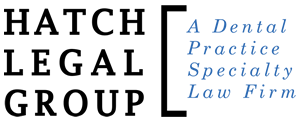The Problem of Defamation in the Dental Office
Defamation is a common litigation tool for disgruntled employees to use if they think they are being terminated for the wrong reasons, and feel it has impacted their career or reputation. In the dental office, supervisors and dentists need to be aware of how defamation claims can arise and how to prevent them in certain situations.
Defamation is defined as the publication of a false statement regarding an individual which damages the individual’s reputation in the community. Oral statements are also considered defamation which is “published,” and are called slander. Even if it is made to just one person it is still actionable.
In the dental office the “community” is often considered to be the dental field in general, and statements which impact future income in this field are particularly easy to classify as defamation. The loss can be economic and verifiable with specific figures regarding compensation lost, or “noneconomic” if the statement is made with “reckless disregard” or “actual malice.” In dental offices, accusations of negligence in treatment of patients, of violating OSHA policies intentionally or regularly, or of committing criminal acts can be possible actions which prompt statements later identified in a lawsuit as defamation. Reckless disregard for ascertaining the truth of the statement may be grounds for a defamation suit even if the facts stated are later determined to be true. If criminal charges are alleged, and a criminal case is eventually ruled to be unfounded, then reckless disregard for the truth can be a valid argument. “Actual malice” can also prevent truth as an absolute defense, particularly in the case of repetition of the defamatory statement, allegation of a crime, or intentionally defaming someone for personal gain.
In a dental office, sometimes a problem comes up with the suspicion of drug abuse by an employee. The seriousness of a drug abuse allegation, and its possible impact on future employment or income, makes it important that the investigation of possible drug abuse be conducted thoroughly and accurately. Clear policies regarding discipline for employees who impaired by drug use when treating patients or in other dental operations must be in an employment handbook, and step by step enforcement policies should be taken. Accusing someone of taking drugs on the job by just saying that their eyes are glazed or speech is impaired should be prefaced by more specific and less aggressive investigation before making the allegation. It might be a good idea to recommend treatment or participation in a drug rehabilitation program before terminating the employee with the specific reason of being impaired by drugs on a regular basis.
Stealing supplies, materials or money is also a serious allegation which should be supported before making any clear allegations. Document and confirm suspicions about theft before confronting the individual.
To prevent defamation allegations by terminated individuals it is the standard practice of employers to just provide dates and times of employment when making references unless the reference is a good one. If unfounded rumors are spread among several prospective employers, a terminated employee can file suit for significant damages such as the costs of being “blacklisted” for the rest of their career. If a negative reference is made, make sure it is very well documented and the employee has been provided with a graduated disciplinary process that includes chances to change mistakes or even intentional negative actions.
Written defamation, or libel, is often easier to document as a complaint, since inadmissible hearsay is not needed as much to back up the statement. Personnel files that are not kept locked up or are handled by multiple individuals can be the source of written publication of libelous statements. There are first amendment defenses for public figures, and different rules apply in those situations or in matter that is published in a circulated newspaper or trade journal.
A significant recent area where dentists have been involved in defamation suits as plaintiffs has occurred when former patients write extremely negative and untrue allegations of poor dentistry in social media sites which rate dental professionals. A case involving the Yelp social media site was in the news not too long ago and a landmark decision stating what the rights of a dentist are to file a defamation action against untrue allegations posted on the site were considered. The dental field and all health care fields are particularly vulnerable to this type of criticism, and often the dentist’s hands are tied because they cannot rebut the untrue allegations with the true facts about the treatment because of possible patient privacy or HIPAA violations.
Overall, the key consideration for dental offices in making false statements that may be considered defamatory is to not say things hastily but investigate before making serious allegations. Termination may be the answer, but when unfounded allegations precede the termination a defamation action is waiting for the careless dentist or dental office manager.
